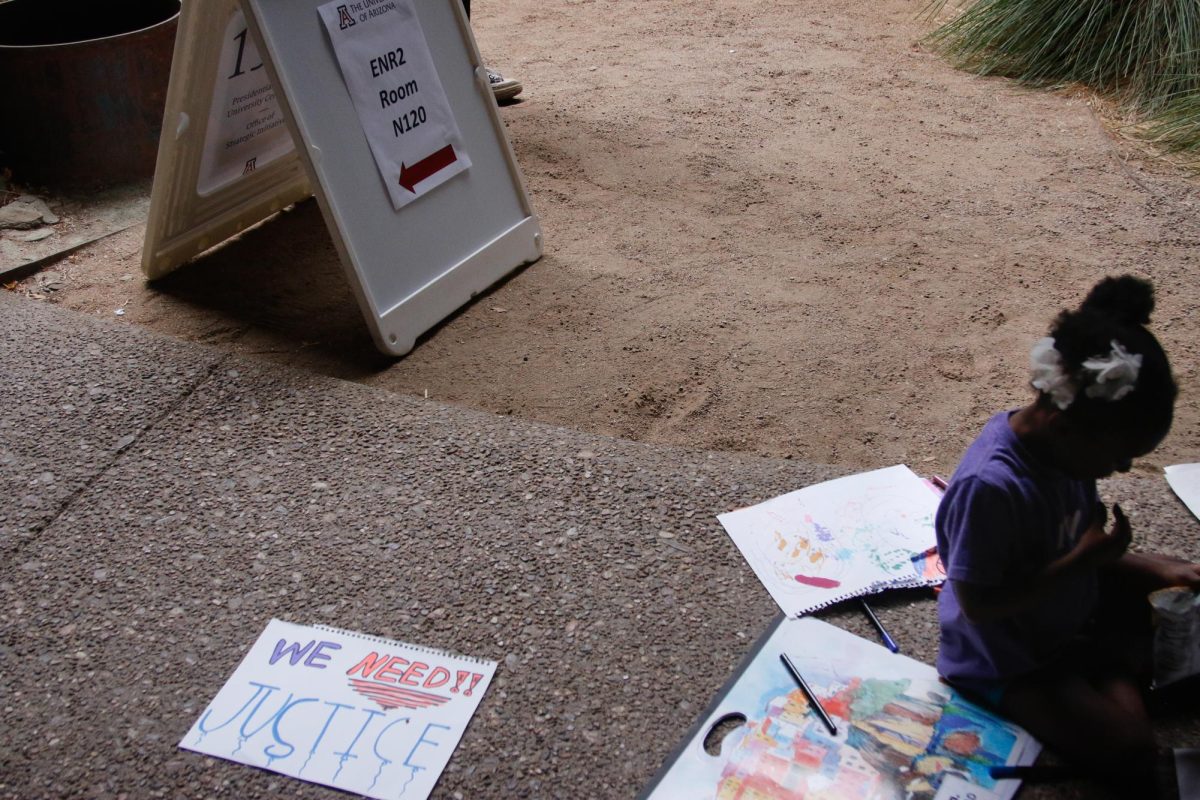
Kate Ewing
A child sits outside the Arizona Board of Regents town hall meeting on April 24, working on outlining letters on poster board next to a completed protest sign that reads “We Need Justice.” The town hall was held on the University of Arizona campus at the Environment and Natural Resources 2 building.
The search for a new University of Arizona president is underway, but some campus organizations feel unseen, unheard and purposefully ousted from having a seat at the table when it comes to making the selection.
The Arizona Board of Regents gave the public 24 hours notice of the April 24 town hall meeting meant to gather input from the community on the search to replace President Dr. Robert C. Robbins. Official public notice from ABOR about the meeting was posted a day prior, April 23.
The meeting in Room 120 of the Environment and Natural Resources 2 Building, was slated to go from 5:30 to 7 p.m., but after 27 minutes, ABOR adjourned.
Prior to the town hall, organizations including the University of Arizona Graduate and Professional Student Council had worked in tandem with United Campus Workers of Arizona to hold a sit-in at 4 p.m. to protest not being notified about the meeting.
“It seems pretty strategic we were excluded from the conversation,” said Maya Braun Yoon, executive vice president of the graduate student council. “We found out about the community input town hall through a web article.”
The specific article Yoon cited was published by KATR News on April 21, three days before the town hall. Yoon said this gave limited time for the organization to rally members of the community to have a physical presence at the meeting.
Yoon said some students or community members who would have attended the town hall were absent due to scheduling conflicts. One example, Yoon cited, was the Students for Justice in Palestine at the University of Arizona, which had an Israeli Apartheid Week event scheduled at the same times as the ABOR meeting.
Those who did show up at the town hall shared grievances with not being on the 18-member UArizona Presidential Search Advisory Committee or made suggestions about what qualities and qualifications the next president should meet.
Some members from the Associated Students of the University of Arizona spoke about wanting to represent the student body’s interests by serving on the presidential search committee. They also shared concern about why an invitation hadn’t already been extended.
Adriana Grijalva, soon to be inaugurated as the new ASUA president, said she is hopeful to meet with the next UA president more than the handful of times current ASUA President Alyssa Sanchez met with Robbins during the academic year.
GPSC President Jeremy Bernick said during their slotted two minutes of speaking time that it felt like a concerted effort on ABORs part to leave student voices out of the presidential search conversations. They also said it seemed like ABOR thought of GPSC as being “too public in (its) demands of transparency and communication” and thus “do not deserve a seat at the table.”
Miranda Lopez, a member of UCW and grad student at the UA, said decisions like hiring an outside executive search firm to find the next president without receiving student input “doesn’t seem to represent the needs of our community.” She said the next president should be more transparent and would ideally be an internal hire.
Lopez also said she wants GPSC and UCW to have much more say in how the search moves forward and that it seemed odd that Robbins, or the president’s office, can send out emails for other previous announcements but failed to send one about the town hall where community input was desired.
“It’s nice they have a virtual link … but it feels a bit sudden,” Lopez said.
Several other speakers supported a preference for the next president to be chosen from the current pool of UA faculty members, who would know what the community is facing.
“What we actually need is a public servant … who has deep ties to this community,” said Anna Cooper. “We don’t need a fancy whiz CEO.”
The other qualities speakers hoped for in a future leader included: a commitment to the environment and fossil fuel divestment; a background in higher education; someone carefully vetted; someone who adheres to ABOR rules and regulations; and an individual who could live up to the positive approval rating of previous UA President Peter Likins.
After all attendees who were slated to speak had finished, the moderator called the meeting to a close and did not open the floor for questions or additional speakers.
ABOR assured those in attendance as the town hall was convened that it would be meeting with organizations including ASUA and UCW to hear concerns or suggestions and future town hall meetings would be held as the search continues.
Those interested in offering input or comments about the UA presidential search can submit to [email protected].
Arizona Sonoran News is a news service of the University of Arizona School of Journalism.